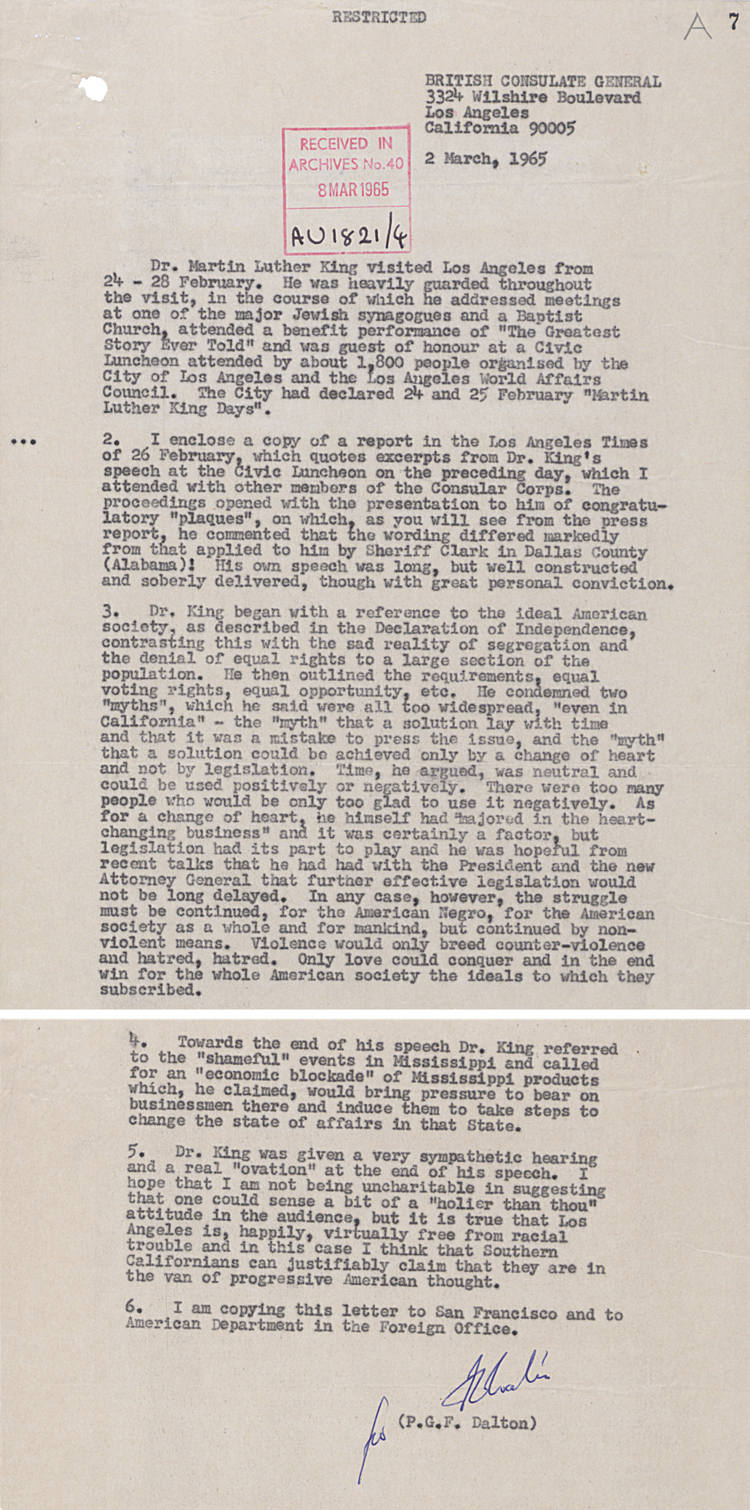
Report from Britain’s Consul-General in Los Angeles on a speech by Martin Luther King, 2nd March 1965 (FO 371/179611)
Transcript
RESTRICTED
BRITISH CONSULATE GENERAL
3324 WIlshire Boulevard
Los Angeles
California 90005
2 March, 1965
Dr. Martin Luther King visited Los Angeles from 24 – 28 February. He was heavily guarded throughout the visit, in the course of which he addressed meetings at one of the major Jewish synagogues and a Baptist Church, attended a benefit performance of “The Greatest Story Ever Told” and was guest of honour at a Civic Luncheon attended by about 1,800 people organised by the City of Los Angeles and the Los Angeles World Affairs Council. The City had declared 24 and 25 February “Martin Luther King Days”.
2. I enclose a copy of a report In the Los Angeles Times of 26 February, which quotes excerpts from Dr. King’s speech at the Civic Luncheon on the preceding day, which I attended with other members of the Consular Corps. The proceedings opened with the presentation to him to congratulatory “plaques”, on which, as you will see from the press report, he commented that the wording differed markedly from that applied to him by Sheriff Clark in Dallas County (Alabama)! His own speech was long, but well constructed and soberly delivered, though with great personal conviction.
3. Dr. King began with a reference to the ideal American society, as described In the Declaration of Independence, contrasting this with the sad reality of segregation and the denial of equal rights to a large section of the population. He then outlined the requirements, equal voting rights, equal opportunity, etc. He condemned two “myths”, which he said were all too widespread, “even in California” – the “myth” that a solution lay with time and that it was a mistake to press the issue, and the “myth” that a solution could be achieved only by a change of heart and not by legislation. Time, he argued, was neutral and could be used positively or negatively. There were too many people who would be only too glad to use it negatively. As for a change of heart, he himself had “majored in the heart-changing business” and it was certainly a factor, but legislation had its part to play and he was hopeful from recent talks that he had had with the President and the new Attorney General that further effective legislation would not be long delayed. In any case, however, the struggle must be continued, for the American Negro, for the American society as a whole and for mankind, but continued by non-violent means. Violence would only breed counter-violence and hatred, hatred. Only love could conquer and in the end win for the whole American society the ideals to which they subscribed.
4. Towards the end of his speech Dr. King referred to the shameful events in Mississippi and called for an “economic blockade” of Mississippi products which, he claimed, would bring pressure to bear on businessmen there and induce them to take steps to change the state of affairs in that State.
5. Dr. King was given a very sympathetic hearing and a real “ovation” at the end of his speech. I hope that I am not being uncharitable in suggesting that one could sense a bit of a “holier than thou” attitude in the audience, but it is true that Los Angeles is, happily, virtually free from racial trouble and in this case I think that Southern Californians can justifiably claim that they are in the van of progressive American thought.
6. I am copying this letter to San Francisco and to American Department in the Foreign Office.
P.G.F. Dalton
